Ireland is facing a difficult choice
Ralitsa Kovacheva, January 24, 2011
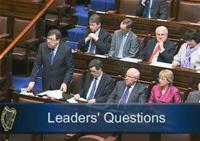 Ireland is facing a severe political crisis and it is unclear whether the government will survive until the general elections, scheduled for March 11. Prime Minister Brian Cowen fulfilled the promise to call an early election, made in November last year when the country requested financial assistance from the rescue fund for the euro area. However, the subsequent developments have put him in an extremely difficult situation at a time when the Parliament is to begin the debates on the 4-year budgetary strategy, part of the rescue program agreed with the EU and the IMF.
Ireland is facing a severe political crisis and it is unclear whether the government will survive until the general elections, scheduled for March 11. Prime Minister Brian Cowen fulfilled the promise to call an early election, made in November last year when the country requested financial assistance from the rescue fund for the euro area. However, the subsequent developments have put him in an extremely difficult situation at a time when the Parliament is to begin the debates on the 4-year budgetary strategy, part of the rescue program agreed with the EU and the IMF.
Indeed, it is the so-called “rescue” loan that causes an avalanche of problems for the Irish government. The decision to request external financial assistance was being continuously delayed by the government exactly because of the painful political consequences that were to be expected. Ultimately, however, Ireland has been put 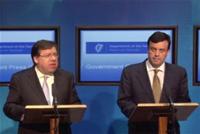 under strong pressure from the markets on the one hand and from its colleagues in the euro area, on the other, because of the fears that raising interest rates will prove prohibitive for Portugal and Spain. The very same day when the government announced that the country would receive a bailout loan from the rescue fund, the Green party (minor coalition partner of the Prime Minister's Fianna Fail) announced it would leave the government because the decision was not agreed with it.
under strong pressure from the markets on the one hand and from its colleagues in the euro area, on the other, because of the fears that raising interest rates will prove prohibitive for Portugal and Spain. The very same day when the government announced that the country would receive a bailout loan from the rescue fund, the Green party (minor coalition partner of the Prime Minister's Fianna Fail) announced it would leave the government because the decision was not agreed with it.
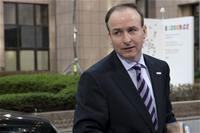 Only two months later on January 23 (Sunday) the Greens formally left the governmental coalition, and their two ministers resigned. Earlier this month 5 more ministers had left the cabinet and last week Foreign Minister Micheal Martin submitted his resignation. So the government has now only 7 members (out of 15), which is the minimum admissible number under the Irish Constitution. Micheal Martin's resignation came as a result of the internal problems in Fianna Fail after the Prime Minister, Brian Cowen, won a vote of confidence as a party leader. In spite of this Cowen declared he would give up leadership but would remain a Prime Minister until the elections.
Only two months later on January 23 (Sunday) the Greens formally left the governmental coalition, and their two ministers resigned. Earlier this month 5 more ministers had left the cabinet and last week Foreign Minister Micheal Martin submitted his resignation. So the government has now only 7 members (out of 15), which is the minimum admissible number under the Irish Constitution. Micheal Martin's resignation came as a result of the internal problems in Fianna Fail after the Prime Minister, Brian Cowen, won a vote of confidence as a party leader. In spite of this Cowen declared he would give up leadership but would remain a Prime Minister until the elections.
In practice Ireland is currently a country that has a Prime Minister without a political party and a government without parliamentary support. In parallel to the adoption of the budgetary bill and the preparation for early elections, Fianna Fail must elect a new leader. The main contenders are Micheal Martin and the current Finance Minister Brian Lenihan. According to the Irish Independent newspaper, Mr Martin has a significantly greater chance to win because of his open criticism toward Brian Cowen.
On Monday the parliamentary parties had to start consultations on the 4-year 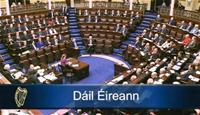 budgetary strategy which is to be discussed this week in Parliament. However, according to the Prime Minister and the Finance Minister the time shall not be enough for the adoption of such a bulky and complex legislation. Meanwhile the opposition is planning a non-confidence vote to the government on Tuesday. The Greens, who occupy as from Monday the opposition seats, pledged to vote in favour of the financial legislation. The other opposition parties - Fine Gael, the Labour Party and Sinn Fein - only stated their co-operation in the debates, but did not go so far as to declare their support for the financial bill.
budgetary strategy which is to be discussed this week in Parliament. However, according to the Prime Minister and the Finance Minister the time shall not be enough for the adoption of such a bulky and complex legislation. Meanwhile the opposition is planning a non-confidence vote to the government on Tuesday. The Greens, who occupy as from Monday the opposition seats, pledged to vote in favour of the financial legislation. The other opposition parties - Fine Gael, the Labour Party and Sinn Fein - only stated their co-operation in the debates, but did not go so far as to declare their support for the financial bill.
The non-adoption of the financial bill will endanger the agreement with the EU and the IMF. In return for the 85 billion euro financial assistance Ireland has committed itself to apply 10 billion euro budgetary cuts within a period of 4 years, along with 5 billion Euro revenue increases. 40% of the total cuts (6 billion Euro) have to be made this year only. According to Irish media, however, there is an overwhelming public resistance to the proposed governmental measures.
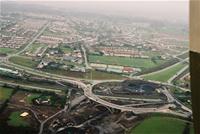 The main reason for the financial difficulties of the country is the need to pour money into failing banks, and taxpayers strongly disapprove the prospective to pay for the mistakes of bankers and investors. At the same time, the number of mortgages in arrears or rescheduled ones is 70,000 out of 788,000 (one in every 11 mortgages) but because of the fall in housing prices 330,000 households are exposed to the same risk, David McWilliams writes in his analysis for Irish Independent. Adding to the picture the unemployment, the spending cuts and the unexpectedly low economic growth, the menace could soon expand to a huge problem.
The main reason for the financial difficulties of the country is the need to pour money into failing banks, and taxpayers strongly disapprove the prospective to pay for the mistakes of bankers and investors. At the same time, the number of mortgages in arrears or rescheduled ones is 70,000 out of 788,000 (one in every 11 mortgages) but because of the fall in housing prices 330,000 households are exposed to the same risk, David McWilliams writes in his analysis for Irish Independent. Adding to the picture the unemployment, the spending cuts and the unexpectedly low economic growth, the menace could soon expand to a huge problem.
On top of that, there is an ever growing criticism that the Irish rescue loan is unfavourable for the country because of the high interest rates (about 6%), which are fuelling further discontent. At this stage, European officials only commented that the interest rate is consistent with that of Greece agreed last spring but kept silent about its possible reduction. Against this background and in view of the upcoming elections many analysts believe that if the 4-year budgetary strategy is not adopted this week, it will never be.
This will seriously affect the country's image as well as the market interest rates on its loans. As it has happened previously, the situation in Ireland will inevitably affect the interest rates in the other eurozone countries. Portugal is pointed out to be the first potential victim but recently the attention is being directed to Belgium. The Belgian example demonstrates the importance of political stability to the markets where the reason for their distrust in Brussels is not the economic situation but the lack of a government for more than half a year.
The only chance for Ireland now is a quick agreement in the Parliament on the 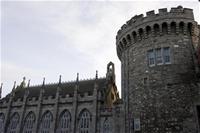 financial legislation and the elections to be held as early as possible in February. According to a poll quoted by EUobserver currently the frontrunner at 35% is Fine Gael – the centre-right formation, member of the European People's Party. Support for the ruling Fianna Fail has dropped to 14%. The party, which is a member of the European liberals, has been in power for 14 years.
financial legislation and the elections to be held as early as possible in February. According to a poll quoted by EUobserver currently the frontrunner at 35% is Fine Gael – the centre-right formation, member of the European People's Party. Support for the ruling Fianna Fail has dropped to 14%. The party, which is a member of the European liberals, has been in power for 14 years.
 Klaus Regling | © Council of the EU
Klaus Regling | © Council of the EU Mario Centeno | © Council of the EU
Mario Centeno | © Council of the EU Mario Centeno | © Council of the EU
Mario Centeno | © Council of the EU Angela Merkel, Emmanuel Macron | © Council of the EU
Angela Merkel, Emmanuel Macron | © Council of the EU Benoit Coeure | © Council of the EU
Benoit Coeure | © Council of the EU Pierre Moscovici | © Council of the EU
Pierre Moscovici | © Council of the EU